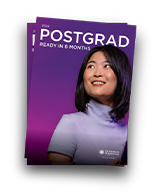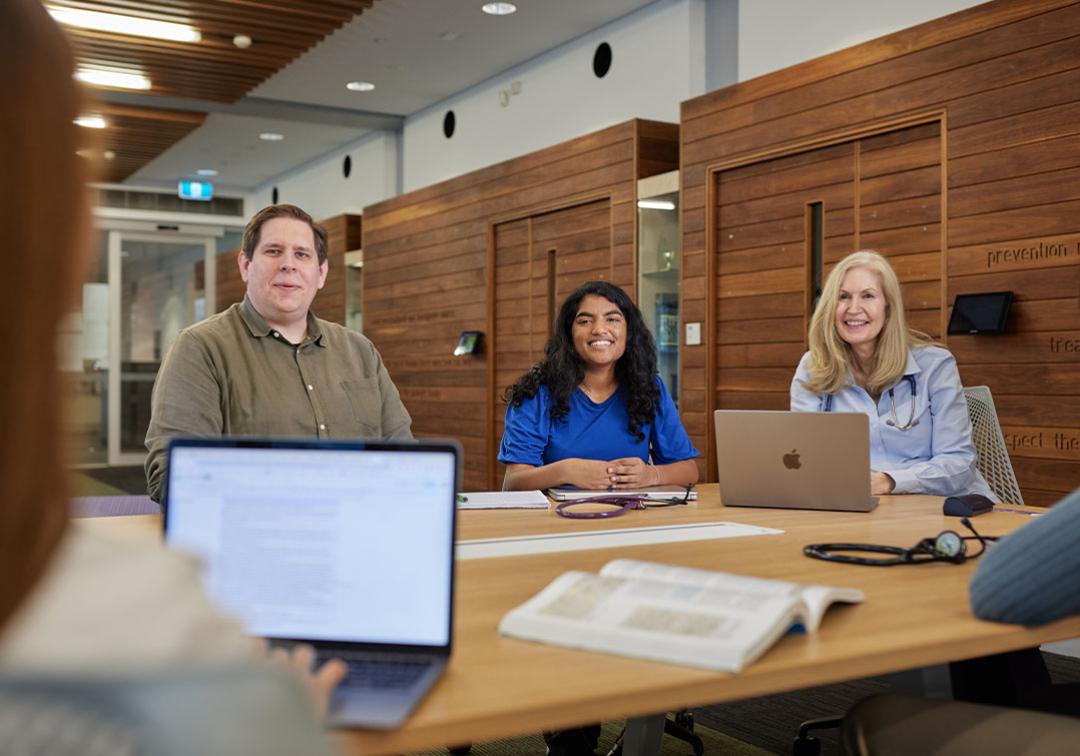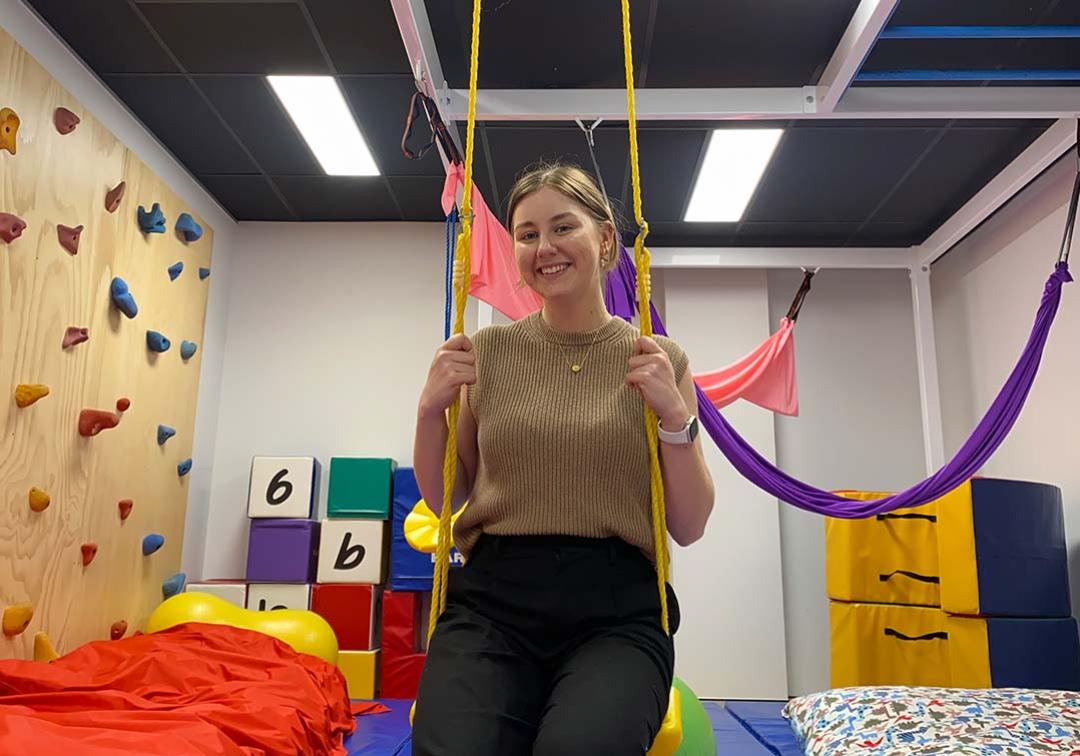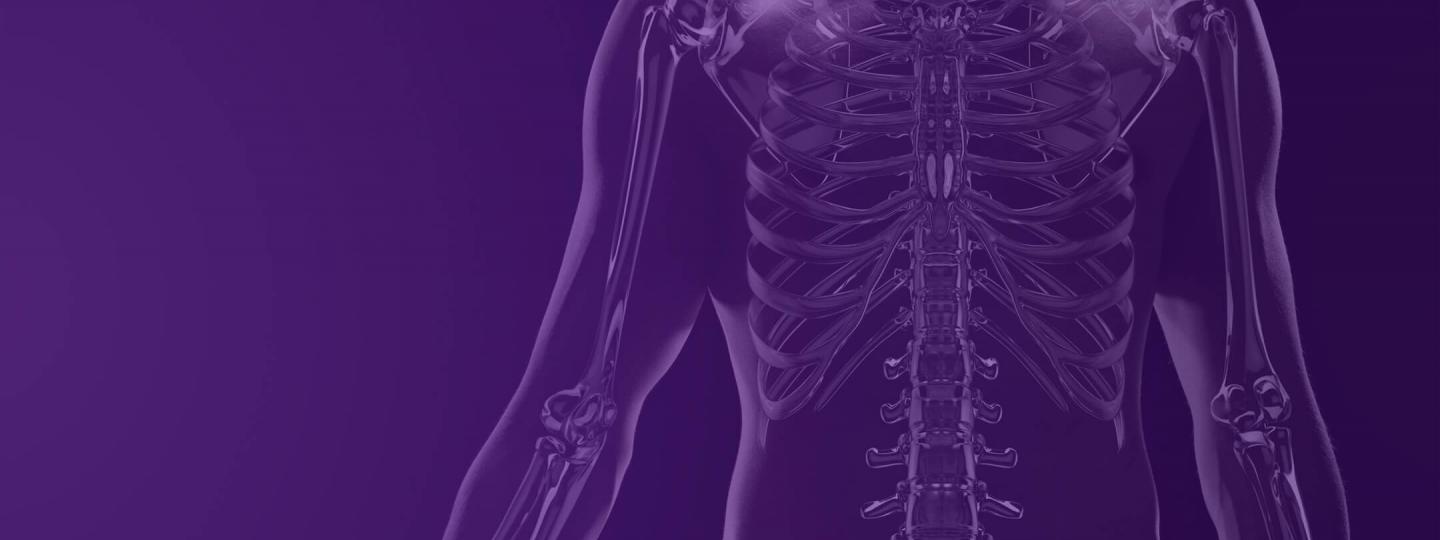
Doctor of Medicine
Overview
Our UQ Doctor of Medicine will provide you with a world-class medical education. You'll gain hands-on experience preparing you to work in any global setting.
We nurture and educate medical graduates who are clinically excellent, team players, kind and compassionate, serve responsibly and dedicated to continual improvement of health among people and communities.
From 2023, we’ll be offering our revisioned Doctor of Medicine (MD) program, designed to build on the enthusiasm, maturity and diversity of our students. It features a streamlined structure that takes an integrated approach to active learning. Across the program you’ll be able to tailor your learning by choosing enrichment opportunities.
You'll join a 'learning community', a clinical home for your ongoing learning through the program.
- Year 1 focuses on fundamental concepts of medical sciences, clinical, professional and procedural skills, and the role of the doctor.
- Year 2, learn in clinical practice settings, developing knowledge and skills for medical practice, focusing on symptomatology of common conditions and clinical reasoning.
- Year 3, be immersed in hospital and community settings, with structured teaching and clinical learning in the workplace.
Your final semester is a dedicated Transition to Practice term where you will be an active pre-intern member of a clinical team – this will help you make the safe and effective transition to internship/residency and your ongoing medical career.
Program highlights
- Develop the advanced critical thinking and clinical reasoning skills required for safe, high-quality clinical practice.
- Build your own unique medical degree.
- Integrated, clinically-contextualised learning with early patient contact.
- Incorporate research into your medical degree.
- Accredited by the Australian Medical Council and recognised by the Medical Board of Australia.
How you'll learn
Your learning experiences are designed to best suit the learning outcomes of the courses you choose.
- Lectures
- Tutorials
- Work placements
- Overseas study
- Laboratory work
- Peer-assisted study sessions
- Workshops
What you'll study
At UQ, degrees are called 'programs' and subjects are called 'courses'. Here's a sample of the courses you could study in this program:
- Foundations of Medicine
- Developing Skills in Medicine
- Clinical Immersion
- Advanced Practice
- Transition to Practice
Career possibilities
Postgraduate study can take you anywhere. Here are some of the careers you could be on your way to:
- General practitioner
- Surgeon
- Patient assessor
- Public health manager
- Clinical academic
- Clinical research coordinator
- International aid worker
- Defence force member
Professional memberships
When you graduate, you may be eligible for memberships with the following professional organisations. Contact the organisation to find out how to become a member.
- Medical Board of Queensland
Program accreditation
The Doctor of Medicine is accredited by:
- Australian Medical Council
Events
See all eventsStories
See all storiesUQ people
Meet the expert: exploring nutrition education with Dr Olivia Wright
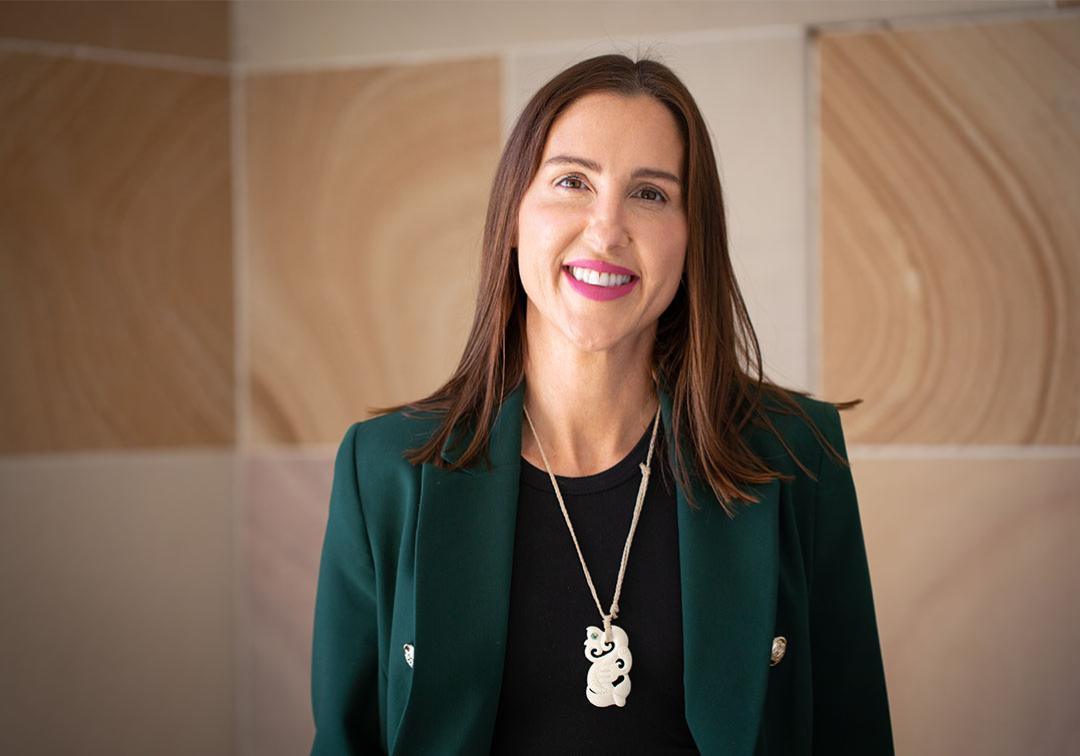
UQ people
Meet the expert: instilling confidence in future physiotherapists with Dr Roma Forbes
Stories
See all storiesUQ people
Meet the expert: exploring nutrition education with Dr Olivia Wright

UQ people
Meet the expert: instilling confidence in future physiotherapists with Dr Roma Forbes
Entry requirements
Entry requirements
To be eligible for entry, you'll need:
If you're in Year 12, you can enter the Doctor of Medicine through the provisional entry pathway.
For provisional entry, you'll need:
- an adjusted ATAR 95 (or equivalent)
- Queensland Year 12 (or equivalent) English
- a competitive University Clinical Aptitude Test for Australia and New Zealand (UCAT ANZ) aggregate score from the year you apply, and
- to attend a multiple mini-interview (MMI) .
If you receive a provisional entry offer, to progress to the MD, you'll also need:
- to complete your first degree at UQ within the minimum time specified for the program
- a grade point average (GPA) of 5.0 on a 7-point scale in your first degree, and
- to complete the MD subject prerequisite courses.
Learn more about provisional entry pathway options
Graduate entry (for university graduates)
If you have completed or are in your final year of a bachelor's degree, you can enter the Doctor of Medicine through the graduate entry pathway.
For graduate entry, you'll need:
- a bachelor's degree (or equivalent) (known as a key degree)
- a grade point average (GPA) of 5.0 on a 7-point scale in your key degree
- a minimum score of 50 in each section of the Graduate Medical School Admissions Test (GAMSAT) or for international applicants 504 in the Medical College Admission Test (MCAT)
- to attend a multiple mini-interview (MMI), and
- successful completion of the required MD subject prerequisite courses.
You'll also need to complete:
- your key degree within 10 years prior to the year you commence the MD, and
- the GAMSAT or MCAT within 4 years before the year you commence.
Learn more about graduate entry pathway options
For further details about admission and selection requirements, refer to Schedule 3 of the Undergraduate, Doctor of Medicine, Non-Award and CSP Admissions Procedure.
If you're in Year 12, you can enter the Doctor of Medicine through the provisional entry pathway.
For provisional entry, you'll need:
- an adjusted ATAR 95 (or equivalent)
- Queensland Year 12 (or equivalent) English
- a competitive University Clinical Aptitude Test for Australia and New Zealand (UCAT ANZ) aggregate score from the year you apply, and
- to attend a multiple mini-interview (MMI) .
If you receive a provisional entry offer, to progress to the MD, you'll also need:
- to complete your first degree at UQ within the minimum time specified for the program
- a grade point average (GPA) of 5.0 on a 7-point scale in your first degree, and
- to complete the MD subject prerequisite courses.
Learn more about provisional entry pathway options
Graduate entry (for university graduates)
If you have completed or are in your final year of a bachelor's degree, you can enter the Doctor of Medicine through the graduate entry pathway.
For graduate entry, you'll need:
- a bachelor's degree (or equivalent) (known as a key degree)
- a grade point average (GPA) of 5.0 on a 7-point scale in your key degree
- a minimum score of 50 in each section of the Graduate Medical School Admissions Test (GAMSAT) or for international applicants 504 in the Medical College Admission Test (MCAT)
- to attend a multiple mini-interview (MMI), and
- successful completion of the required MD subject prerequisite courses.
You'll also need to complete:
- your key degree within 10 years prior to the year you commence the MD, and
- the GAMSAT or MCAT within 4 years before the year you commence.
Learn more about graduate entry pathway options
For further details about admission and selection requirements, refer to Schedule 3 of the Undergraduate, Doctor of Medicine, Non-Award and CSP Admissions Procedure.
English language requirements
IELTS overall 7; reading 7; writing 7; speaking 7; listening 7. For other English Language Proficiency Tests and Scores approved for UQ
TOEFL iBT (including Paper Edition) - Overall 100, listening 25, reading 25, writing 27, speaking 23.
PTE Academic - Overall 72, sub bands minimum 72.
CES - Overall 185, All sub bands minimum 185.
Other OET - A minimum grade of B for each sub skill (L,S,R,W).
BE is not accepted.
There are other ways to meet the English language requirements. For some programs, additional conditions apply.
Student visas
International students who are accepted into full-time study in the Doctor of Medicine are eligible to apply for an Australian student visa (subclass 500).
There are a number of requirements you must satisfy before a visa is granted, including the Genuine Student (GS) requirement.
Additional application information
There are additional entry pathways if you:
- are an Aboriginal or Torres Strait Islander student
- want to study in the Darling Downs or Southwest Queensland region
- want to study in the Central Queensland and Wide Bay region
Additional application information
There are additional entry pathways if you:
<10>- <10>
- are a US citizen or Permanent Resident seeking to https://ochsner.uq.edu.au/<34>>study in Australia and America <10>
Fees and Scholarships
Indicative annual fee
Approximate yearly cost of tuition (16 units). Your fees will vary according to your selected courses and study load. Fees are reviewed each year and may increase.
$12,720
2024
$12,720
2024
If you’re a provisional entry student, you’ll also need to pay fees for your chosen undergraduate program.
Student Services and Amenities Fee (SSAF)
In addition to course fees, you'll also be charged an SSAF. This used to fund non-academic services for students, including sports and recreation, employment and career advice, child care and food services.
Learn more about the Student Services and Amenities Fee (SSAF)
Approximate yearly cost of full-time tuition (16 units). Your fees will vary according to your selected courses and study load. Fees are reviewed each year and may increase.
AUD $91,819
2024
AUD $91,819
2024
If you’re a provisional entry student, you’ll also need to pay fees for your chosen undergraduate program.
Student Services and Amenities Fee (SSAF)
In addition to course fees, you'll also be charged an SSAF. This used to fund non-academic services for students, including sports and recreation, employment and career advice, child care and food services.
Learn more about the Student Services and Amenities Fee (SSAF)
Additional costs
- Students are expected to fund travel and living expenses associated with placements, some of which may be outside the Brisbane metropolitan area.
- First Aid Certificate (including CPR) (approximately $130 renewed every 3 years)
- Police check for criminal history ($45)
- Costs for vaccinations and serology are the responsibility of the student and will vary based on individual and program requirements.
Government assistance
Financial aid
As an international student, you might be eligible for financial aid – either from your home country, or from the Australian Government.
HECS-HELP
Domestic places in the Doctor of Medicine are Commonwealth Supported. This means the cost of your education is shared between you and the Australian Government.
Instead of tuition fees, Commonwealth Supported students pay what are called student contribution amounts.
HECS-HELP is an Australian Government loan scheme to assist eligible students with the cost of their student contribution amounts.
Commonwealth supported places (CSPs)
Commonwealth supported places are offered in 2 categories: bonded and non-bonded.
Bonded Medical Program (BMP): This Australian Government initiative aims to proactively improve health services and reduce doctor shortages outside metropolitan areas. 28.5% of all Doctor of Medicine CSP offers to a medical program at UQ are made in return for a commitment to work in eligible regional, rural, and remote areas for a specified period after completion of the MD program.
Commonwealth Supported Places (non-bonded medical places): Approximately 71.5 % of all Doctor of Medicine CSP offers are to non-bonded places.
Centrelink support
The Australian Government offers a number of income-support payments to eligible Australian university students.
Scholarships
You may be eligible for more than 100 scholarships, including:
How to apply
Applying online
How you apply depends on what type of applicant you are.
Provisional entry (for school leavers)
If you're finishing high school, you'll apply to the Doctor of Medicine through the provisional entry pathway. Choose your situation to view how to apply:
Graduate entry (for university graduates)
If you have completed or are in your final year of a bachelor's degree, you can enter the Doctor of Medicine through the graduate entry pathway. Choose your situation to view how to apply:
Applying online
How you apply depends on what type of applicant you are.
Provisional entry (for school leavers)
If you're finishing high school, you'll apply to the Doctor of Medicine through the provisional entry pathway. Choose your situation to view how to apply:
- I want to apply to study in Greater Brisbane
- I want to apply to study in the Darling Downs and South West Queensland region
- I want to apply to study in the Central Queensland and Wide Bay region
- I'm an Aboriginal and/or Torres Strait Islander student
Graduate entry (for university graduates)
If you have completed or are in your final year of a bachelor's degree, you can enter the Doctor of Medicine through the graduate entry pathway. Choose your situation to view how to apply:
Important dates
Check the important dates that apply to your situation.
Provisional entry (for school leavers)
Graduate entry (for university graduates)
Important dates
The closing date for this program is:
- Please refer to the GEMSAS website for application dates.
- Please refer to the QTAC website (www.qtac.edu.au) for details of closing dates for the submission of applications, documentation and changes of preference.
To learn more about UQ dates, including semester start dates, view the Academic Calendar.
Aboriginal and Torres Strait Islander applicants
For support with applying – or if you have any questions about university life – get in touch with our Aboriginal and Torres Strait Islander Studies Unit.
Explore other programs
Express yourself. And your interest.
They say choosing a degree is hard, which is why we've made it easy. Register your interest and we'll send you everything you need to know about applying to UQ.

